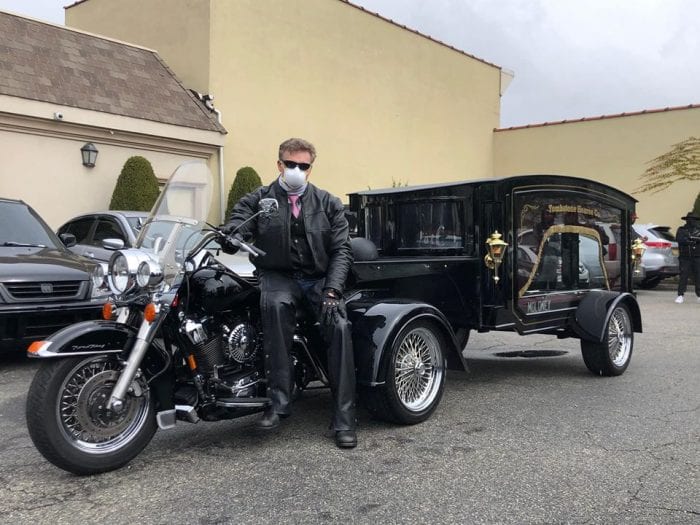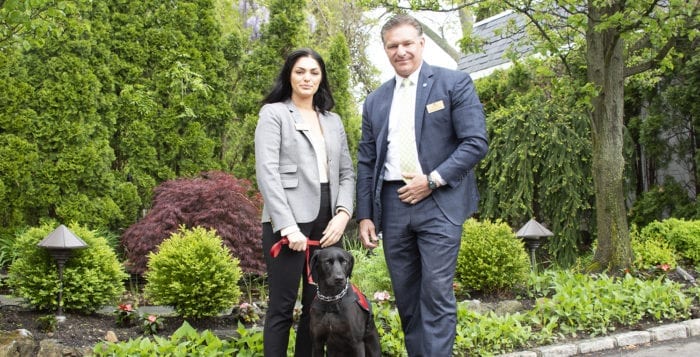Carla Sciara’s father, former Port Jefferson Station resident Ronald “Ronnie” Scalone, passed away March 17 after a long illness, one unrelated to the escalating coronavirus pandemic.
“It just added to the grief of it all.”
— Carla Sciara
Scalone was a past aeronautical engineer at Grumman, and lived a life bound to nature and the Long Island Sound. In Sciara’s father’s final days, he was living in the Patchogue-based Suffolk Center for Rehabilitation, a nursing home that had decided to close most access to visitors, their residents being especially vulnerable to COVID-19.
Sciara was one of the few people the staff allowed in to visit during her father’s final hours. She walked through halls mostly devoid of the normal family members strolling the halls, with nursing home staff all garbed in masks and gloves. Amidst all the pain and suffering of losing her father, she said dealing with the panic and stress of a pandemic was like “grieving twice.”
For people looking to mourn and memorialize the recently passed, the ongoing coronavirus crisis has upended everything. Places of worship of every denomination far and wide have limited their public services, and with Centers for Disease Control and Prevention guidelines having limited the number of people in a room at once, services for the recently passed have become small, solemn affairs.
Sciara had worked with Robertaccio Funeral Home in Patchogue, who she called “amazing” for their work with her father’s cremation, and Infant Jesus R.C. Church in Port Jefferson for either a Mass and funeral arrangements, but she decided to hold off, knowing family who live as far away as Florida shouldn’t be traveling during the ongoing pandemic. She has plans to celebrate his life sometime in the future, after the end of the panic, though it’s hard to say when that will be.
“It just added to the grief of it all,” she said. “We wanted to celebrate his life.”
Beyond the fear and the tragedy of the more than 200 people in Suffolk County who have died from the virus, the act of mourning has become limited. Funeral homes throughout the North Shore have limited the number of people who can be at a service at a time and have looked to offer people as much ability to grieve as they can.
The March 22 executive order by Gov. Andrew Cuomo (D) called funeral homes essential businesses, but houses of worship, where many services are held, were not. Not only that, but CDC guidelines advise limiting such occasions to 10 or less people.
“This isn’t what the community wants — this is something that is forced upon us.”
— Peter Moloney
Funeral Homes like M.A. Connell in Huntington Station have severely limited the number of services they host, with arrangements being made by only two or less people or done via phone or email. Services are limited to 10 people or less and to one hour. Only one service is allowed at a time.
Peter Moloney, along with his brother Daniel Moloney Jr., owns Moloney Family Funeral Homes, with eight locations on Long Island including Port Jefferson Station, Lake Ronkonkoma and Hauppauge. The challenge has been allowing people the room to grieve when there are limits on how many people can be in the same place at once.
“This isn’t what the community wants — this is something that is forced upon us,” Moloney said. “The families still need to grieve.”
Moloney’s has established tents at some of their locations for families to hold ceremonies outside. While their website lists a maximum of 10 mourners for each gathering, he said he wouldn’t simply deny a family if they wished to bring in around 20, but the goal is to limit the number of people in the same space. Otherwise, they are providing access for families to listen to the prayers via online streaming. They are also offering alternative services such as a motorcycle-based farewell ride through town.
The facilities are also being sanitized regularly after every service. But the hardest part of these services in the time of a pandemic is watching people necessarily stay apart. Even in tight-knit groups, friends and family not living in the same house often try to keep apart, even when the inclination is to hold each other in times of grief.
“A lot of these people are passing away alone, so it’s really doubly troubling for families and emotional,” Moloney said. “People are keeping their spacing.”
Paul Vigliante, who owns Branch Funeral Homes in Miller Place and Smithtown along with his family, said his locations too have been limited in the number of people who can attend services. These, he added, have been for the most part limited to one a day. They have also set up live streaming of the services through Zoom for extended family and friends, which “has worked well so far.”
Vigliante said they have cleaning staff on hand seven days a week and have worked not just to protect the people coming to grieve but staff as well. The owners have also encouraged mourners to stay six feet apart from each other, even in the chapel.
“It’s a truly heartbreaking time,” he said. “We’re doing the best we can to allow families that time to grieve … It’s very difficult. It’s unfortunate the circumstances we’re living through.”
Despite the hardship of putting off a full service for her father, Sciara still marveled at the work and professionalism of everyone she’s interacted with, from the staff at the nursing home to the funeral home to the church.
“They were willing to do whatever we wanted to do,” she said. “It’s brought out a whole lot of good. It’s incredible how people are still coming together.”







